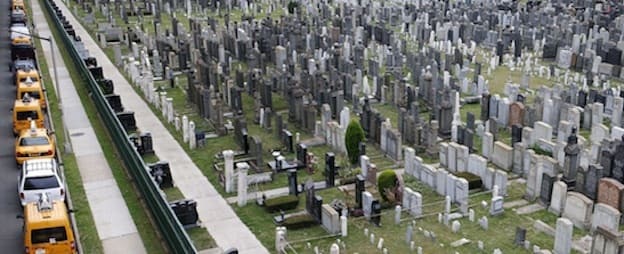What’s the first thing that meets the eye of those stuck in traffic in the bottleneck at the entrance to Jerusalem? Those entering the gates of the city are greeted by a city of the dead looking down from the mountain. In the holy tongue, such a site is called a House of Life, an Eternal Home and a Home That Awaits the Living.
Maybe it’s a metaphor for the state of the holy city and the land. Not a city or land of many days, but a city and land of many graves, which take up every good corner of nature. The metaphorical “tree of the field,” from the biblical verse and the popular song, is uprooting every sapling, eliminating the greenery and destroying nature. And all in the service of the dead and their sanctity.
Whether it’s the way of the world since man was created, or it’s the nature of those who fight over this fortified land, the dead are constantly multiplying. And because the dead have long since taken over the mountain and don’t rest for a moment, they are creating a necro-demographic and necro-topographical problem.
Recently we’ve been reading about a grandiose project in the advanced stages of construction. Across Har Hamenuchot cemetery they are digging tunnels to be used for future burials. Those in charge explain that it will provide burial places for the next 20 years. None of those responsible is asking the obvious question: And what next? Should providing for the needs of the dead be our only major concern?
Nobody sees what lies ahead, and nobody is thinking about solutions for those who are now living on earth and those who will be living in the coming generations. This land is so small, and it’s becoming more crowded from day to day.
That’s why this is the time to think about the future. Not about the quality of death of those who are gathered to their forefathers, but about the quality of life of this generation and those to follow. Just as there is a need for denser construction and for encouraging development that leaves open spaces, we have to think about an optimal solution for burial. In a small and crowded country like ours, we have to think about a green solution. It’s called sustainability. We have to think out of the box and to find another way to absorb, store or recycle human waste, which is generated by human beings on their journey to the “House of Life.”
In a place where the multiplying dead will settle all over this small and crowded country, as cities of the dead are built for them that spread and blight nature, the governmental authorities must impose regulations or pass laws forbidding the takeover of areas of land for cemeteries. Instead, the government must promise to provide cremation services for all the dead. After all, it already says in the Book of Books: “For you are dust and to dust you shall return.”
For that purpose, citizens would be asked to register a will in which they would choose a species of tree that the state would plant in their name after their death. The hole in which the chosen tree was planted would be their grave and their ashes would be placed in its soil.
Everyone would profit from such a solution – the dead who have returned to dust, those who are alive today and those who will be alive tomorrow. In that way it could well and truly be said that the words of the poem were fulfilled: “With their death they commanded us life.”
Haaretz, Jan 15, 2018
***
For Hebrew, press here

